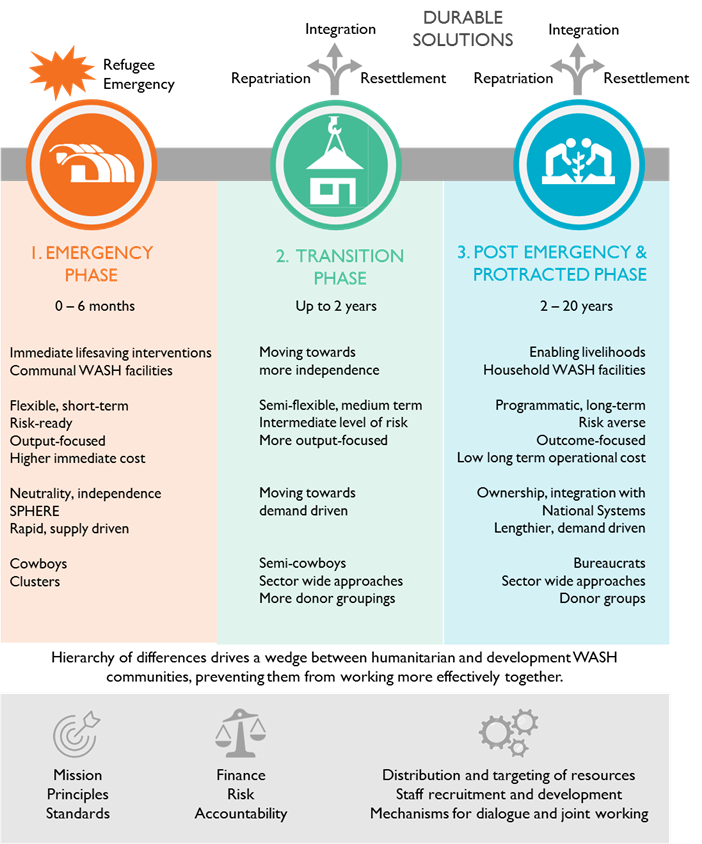Humanitarian WASH emergencies outlast the initial phase and turn into longer-term WASH programmes so development and humanitarian aid need to work together.
Published on: 25/10/2018
It is hard to believe how quickly two years can go by, but they have! I have been privileged to work with World Vision (WV) in the area of WASH -- specifically in the Middle Eastern countries of Iraq, Jordan, Lebanon, Syria and also in Afghanistan, which are all countries with minimal WASH literature. One of the most interesting findings from my work during this period was the variety of WASH activities that are taking place in these countries, from basic humanitarian (0-6 months), to transitional (6 months- 2 years), to long term (beyond 2 years) WASH. These different time spans are noted in the recently published document by UNHCR on WASH in emergencies. As a means of reflecting on these developments, together with the WV WASH advisers in each of the countries, plus two University of North Carolina- Water and Health Institute interns (based in Jordan), we developed a document entitled “Creating sustainable WASH programmes: A compilation of lessons learnt in five countries”. The results of this joint effort is one of the first documents on WASH in the Middle East region.
While working in the field, it became very apparent to me that the worlds of humanitarian aid and water, sanitation and hygiene (WASH) in development all too often operate separately in terms of operational structures, donor support, etc. This in essence creates gaps in service provision and increases the vulnerability of the poorest and most marginalised populations.

The diagram below shows the three phases of WASH. It is based on the initial work done by both UNHCR and the Overseas Development Institute (ODI). What is clearly apparent is that humanitarian WASH emergencies, with refugee influxes, often outlast the initial phase and move on to transitional or longer-term WASH programmes. More than ever before situations have evolved into protracted WASH crises (Carpenter and Bennett, 2015). At the same time, development actors engaged in such contexts cannot rely solely on humanitarian counterparts alone in the face of short-term emergencies. Challenges to effective response in protracted crises include issues with insecurity; extreme and unpredictable need; and often broken trust between populations, government, and external agencies (ICRC, 2015; Mosel and Levine, 2014). As a result, the provision of WASH services can become extremely costly, reduce the effectiveness of targeting, make sustainable programming more difficult, and ultimately increase the vulnerability of poor and marginalised people to disease and missed socio-economic opportunities in urban and/or rural areas. These challenges also extend to government agencies responsible for the provision of WASH services, such as ministries of water who rarely have the mandate, resources, or human capacity for an emergency response beyond the rehabilitation of their own systems.

Research undertaken by ODI and supported by UNICEF and the World Bank's Water and Sanitation Program examined why there is a disconnect between humanitarian WASH and development WASH, and what can be done about it (Mason and Mosello, 2016).
The study draws on a literature review, extensive consultation with global experts, and two in-depth case studies in South Sudan and the Democratic Republic of Congo (DRC). Mason and Mosello argue that the WASH solutions are available, and it is the responsibility of WASH practitioners from both humanitarian and development sectors to lead real change. The task is to remove barriers that currently drive the sectors apart by building on the strengths and capacities of existing local organisations, rather than inventing new global initiatives. This could, for example, entail capacity building of local organisations on the challenges and possible solutions from both the humanitarian and development WASH perspective. This way there is chance of bringing these two WASH worlds together. That is the hope and aspiration not only for those cited here, but also my personal one.
I am now working as a global senior humanitarian WASH specialist for Save the Children based in Amman, Jordan. It is clear that the humanitarian WASH need will remain, given the increase in influx of refugees world- wide to a record 68.5 million (UNHCR, 2018). Further reflection on how the humanitarian and development WASH can work more effectively together is a key opportunity for all those working in WASH with the ultimate goal of creating more effective and lasting WASH services for everyone.
At IRC we have strong opinions and we value honest and frank discussion, so you won't be surprised to hear that not all the opinions on this site represent our official policy.